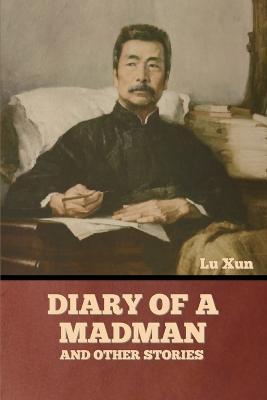Diary of a Madman and Other Stories

Diary of a Madman and Other Stories
The diary form and the idea of the madman who sees reality more clearly than those around him were inspired by Nikolai Gogol's short story "Diary of a Madman". Lu Xun's "madman" sees "cannibalism" both in his family and the village around him, and he then finds cannibalism in the Confucian classics which had long been credited with a humanistic concern for the mutual obligations of society, and thus used to justify the superiority of Confucian civilization. The story can be read as an sardonic attack on traditional Chinese culture and society and a call for a new culture.
"Diary of a Madman" is the opening story in Lu Xun's first collection, and has often been referred to as "China's first modern short story". It was only the second modern vernacular Chinese story, after Chen Hengzhe's "One Day". It was selected as one of the 100 best books in history by the Bokklubben World Library, and listed as one of the ten best Asian novels of all time by The Telegraph in 2014.
Despite its success and dominance in Chinese literature, Lu Xun's stories took five years before they were widely recognized as a notable works of literature. Before he published the "Diary", Lu Xun was in a state of complete hopelessness and despair. His state of mind being unknown readers during this time, except to the few individuals who were close to him. Thus "Diary of a Madman", with its use of foreign techniques, was not easily comprehensible to most audiences at the time. The theme of cannibalism, and notion of "eating oneself", sparked controversy and criticism among readers due to its ambiguity and interpretation as an extremely harsh criticism of general Chinese culture and traditional ideas. Lu Xun's attempts to cure the cultural malaise which exists in traditional Chinese society through his writings were not easily embraced. However, the "unprecedented" nature of the story and its salient themes and timely arrival captured the attention of many a
PRP: 156.58 Lei
Acesta este Prețul Recomandat de Producător. Prețul de vânzare al produsului este afișat mai jos.
125.26Lei
125.26Lei
156.58 LeiLivrare in 2-4 saptamani
Descrierea produsului
The diary form and the idea of the madman who sees reality more clearly than those around him were inspired by Nikolai Gogol's short story "Diary of a Madman". Lu Xun's "madman" sees "cannibalism" both in his family and the village around him, and he then finds cannibalism in the Confucian classics which had long been credited with a humanistic concern for the mutual obligations of society, and thus used to justify the superiority of Confucian civilization. The story can be read as an sardonic attack on traditional Chinese culture and society and a call for a new culture.
"Diary of a Madman" is the opening story in Lu Xun's first collection, and has often been referred to as "China's first modern short story". It was only the second modern vernacular Chinese story, after Chen Hengzhe's "One Day". It was selected as one of the 100 best books in history by the Bokklubben World Library, and listed as one of the ten best Asian novels of all time by The Telegraph in 2014.
Despite its success and dominance in Chinese literature, Lu Xun's stories took five years before they were widely recognized as a notable works of literature. Before he published the "Diary", Lu Xun was in a state of complete hopelessness and despair. His state of mind being unknown readers during this time, except to the few individuals who were close to him. Thus "Diary of a Madman", with its use of foreign techniques, was not easily comprehensible to most audiences at the time. The theme of cannibalism, and notion of "eating oneself", sparked controversy and criticism among readers due to its ambiguity and interpretation as an extremely harsh criticism of general Chinese culture and traditional ideas. Lu Xun's attempts to cure the cultural malaise which exists in traditional Chinese society through his writings were not easily embraced. However, the "unprecedented" nature of the story and its salient themes and timely arrival captured the attention of many a
Detaliile produsului










